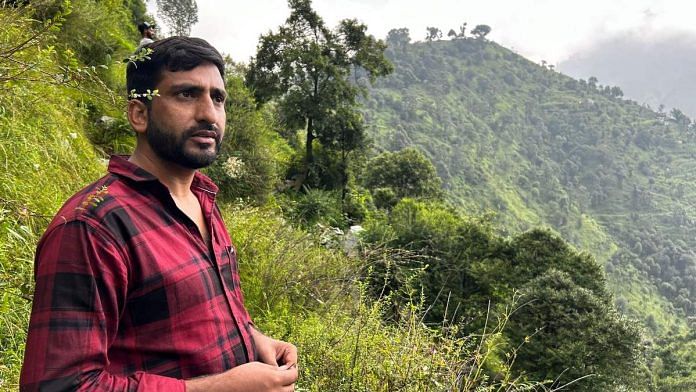Rajouri: Life in Rafik Chaudhri’s home and village in Jammu & Kashmir is exactly where he left it seven years ago when he was arrested by the Mumbai Police for what became a charge of fatal rape.
At his sea green house on top of a mountain, time seems to have stood still. Naked bulbs hang from the ceiling, plaster peels from the walls, and wires dangle loosely. The once-bristling corn fields outside have withered away, forgotten over the years.
And then he returned home last month.
Rafik’s wrongful arrest cost him seven years of his life. He was just 21 at that time. On 31 July 2023, a Mumbai sessions court acquitted him in charges related to the murder and alleged rape of a 74-year-old woman. The judge even said that it was “probable” that the police had planted false evidence against him.
The next day, Rafik walked out of Mumbai’s Arthur Road Jail as a 28-year-old man. He was no longer baby-faced, as old photos show, and streaks of grey were threaded through his hair.
“To everyone, it is seven years; to me, it feels like 14,” his ailing mother Zubeida Begum said. “I just can’t have enough of looking at his face now.”
Rafik’s father, Wali Mohd Choudhari, 55, is relieved his son is now a free man, but he is also bitter.
“The police assumed he was just a migrant labourer from J&K, and that no one would travel over 2,000 km to Mumbai to fight for him,” he said, unable to hold back tears.
Rafik used to dream of saving money and buying a tourist vehicle to operate in the hills near his home in the remote village of Nediya in the Darhal block of Jammu’s Rajouri district. But those plans seem distant now.
“My mother fell extremely sick during my time in jail. I want to take care of her first,” Rafik said when ThePrint visited him 12 days after his acquittal.
With all hope of bail evaporating, Rafik said he felt the crushing weight of each passing day, but he also saw the prosecution’s case falling apart, bit by bit.
“[But] I don’t know where to start,” he said, appearing lost as he held close his youngest nephew, born during his years in jail.
Now, Rafik has returned to Mumbai. He has resumed his job as a watchman at the same middle-class residential society where he worked before. They welcomed him with open arms.
“They arrested an innocent boy, which has been proven in court. All of us in the society are happy about it,” said Asif Gulamrasul, resident and former chairman of the Rizwan Co-operative Housing Society in Oshiwara, Jogeshwari (West). “We don’t care what anyone says. We just want him to work for us again.”
In a way, Rafik’s life has come full circle, for it was within the confines of this very society that his nightmare began with the gruesome murder of a resident in 2016.
A happy start
Rafik made his way from a tiny Gujjar Muslim settlement in Jammu to Mumbai in 2012, shortly after completing Class IX.
At the time, Wali Mohd worked as a security guard at Rizwan Housing Society and had laid out a neat plan for his son’s future. Rafik was to train under him and take over as the society’s watchman; Wali Mohd himself would return to Jammu to take care of the family.
“The hills are no longer enough to build our houses. Most men migrate to either Mumbai or Saudi and Qatar to work,” Wali explained. “My elder son worked as a cab driver and security guard for some years before leaving for Qatar. I thought it was time that Rafik earned too.”
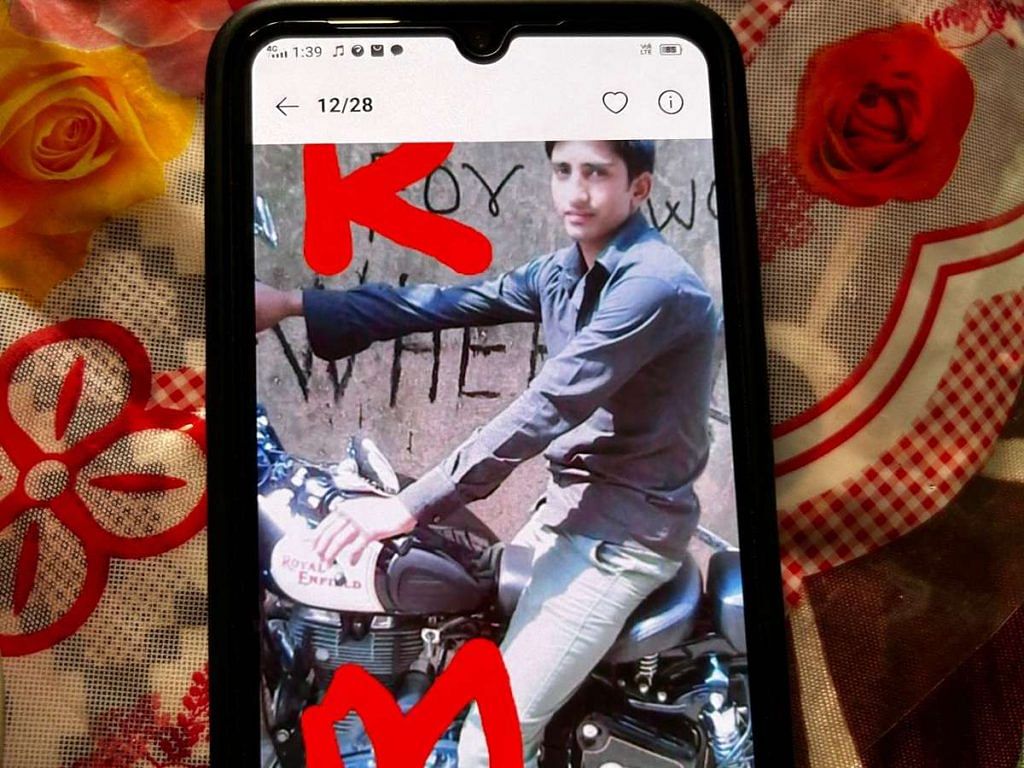
In 2015, Wali Mohd returned to the village, and Rafik assumed his father’s role.
“I started working in the society’s office, maintaining the register, monitoring CCTV, dropping kids at school, and even buying groceries for the residents,” Rafik recalled.
He earned Rs 18,000 per month for this work and, for some extra cash, drove a cab at night, adding another Rs 12,000 to his earnings.
“We were fond of him. He was sincere, helpful, and meant no harm to anyone,” said Gulamrasul, who was serving as chairman of the society at the time.
Then, everything changed.
Murder in the suburbs
On 11 February 2016, resident Abdul Rashid departed for work at 9 am, leaving his 74-year-old wife Mumtaz, alone in their home, Flat No 1 of the D wing.
Abdul phoned her numerous times in the next few hours, but she did not answer. Worried, he asked his grandson, Ahmed Juned Badshah, who lived in a different society, to check in on Mumtaz.
At 12:45 pm, the grandson arrived at the flat. When no one opened the door, he peeped through the bedroom window and saw his grandmother lying lifeless on the floor. When he broke open the door, he saw the blood and the knife wound across her neck, court documents show.
The police quickly arrived at the scene and sent the body for postmortem. A sniffer dog was also brought along to help trace the culprit. Although Rafik was in the building, the dog ran toward a road.
Rafik recalled that he had been given a harrowing task soon after Mumtaz’s body was found. “Abdul Rashid had given me the duty to wash his wife’s blood away and I did as was told,” he said.
Later, when the police returned to gather CCTV footage and continue their inquiries, Rafik claimed he willingly assisted them. “For the next three days, I helped with whatever they asked me to do,” he said.
But then, the officers asked Rafik to come to the police station. When he got there, he received a shock. “They put me in the lock-up,” he said.
The jokes that they had been cracking with me turned into accusations. They put handcuffs on me and made me look like a criminal
– Rafik Chaudhri
Both Asif Gulamrasul and Abdul Rashid testified in court that they saw Rafik at the police station each time they visited during the investigation period between 11 and 21 February.
According to Rafik, the police eventually released him with advice to return to his home in the hills.
“One of the policemen told me that the case was getting murky, and they no longer needed me,” Rafik said.
‘I helped policemen shop for their families’
Fresh out of the lock-up, Rafik took the advice of the police and took a train home. But it was not the homecoming he was looking forward to. While he was still on the way, he got a call from his father — three Mumbai Police officers had arrived in Nediya village, looking for him.
The family, taken by surprise, welcomed the policemen, including investigating officer Parmeshwar Babasaheb Ganme, into their tiny, half-built house. Rafik’s mother, Zubeida, remembered offering them salty tea and food.
Word that the police had travelled 2,000 km to take Rafik away spread quickly and many village headmen from the area trekked to his house to offer support.
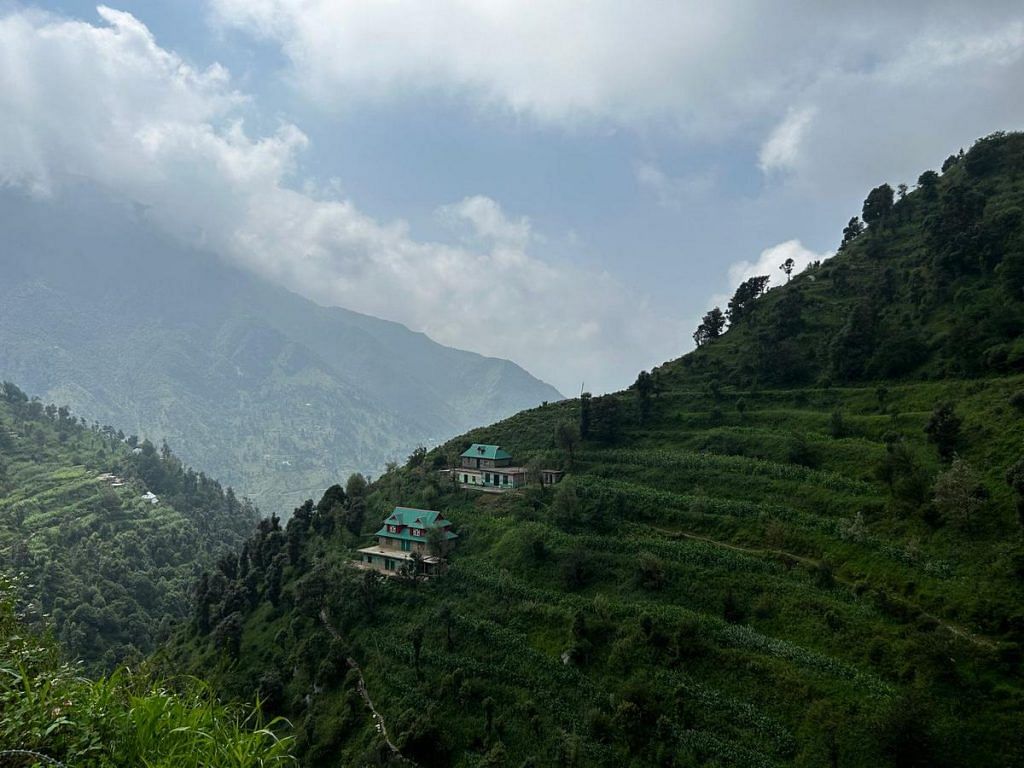
Subsequently, the Mumbai police officers went to the Darhal police station and told the station house officer (SHO) that they had to take Rafik back to Mumbai.
“They told the SHO that Rafik was needed in Mumbai, that they wanted Rafik’s help in the case. They said the society members complained Rafik left without informing them,” said Wali Mohd.
The SHO consented to Rafik’s departure with the Mumbai Police only after they signed an undertaking stating that he was going with them willingly.
Rafik was not overly worried. When the police officers proposed a detour to Vaishno Devi, he readily assumed the role of tour guide.
“I helped them in the visit and to shop for their families,” Rafik said.
But the policemen’s demeanour abruptly changed as soon as the group stepped out of the train in Mumbai on 3 March 2016. There was no more of that earlier friendly banter.
“The jokes that they had been cracking with me turned into accusations. They put handcuffs on me and made me look like a criminal even though I’d been helping them,” Rafik said, still in disbelief.
After that, events unfolded quickly. His Great Mumbai Dream unravelled.
Conflicting press conferences & confession
On 4 March 2016, the police called a press conference and declared that they had cracked the case. They claimed that their suspicions were aroused when Rafik “fled” for Jammu and that they had recovered incriminating physical evidence.
According to the police, Rafik had killed Mumtaz because he was about to be fired from his watchman job and, so, wanted to frighten residents and create doubts about the new guard. The elderly victim, they claimed, was just a “soft target” in this alleged ploy.
However, the police were unprepared for one thing: the Rizwan Society organised a counter press conference to set the record straight. They clarified that Rafik had not been fired and alleged that he was being framed by the police.
But it was already too late for Rafik. He had signed a confession.
He said he did so only under extreme duress. “I was subjected to unspeakable torture. At one point, I just broke down. They brought a paper in Marathi, which I couldn’t read. I demanded the paper in either Urdu or English, but then they became cruel with me,” he said.
Eventually, he said, he gave up and scribbled his name on the paper. Rafik was sent to Arthur Road Jail on 14 March 2016. The police filed the chargesheet under sections 452 (house trespass after preparation to hurt) and 302 (murder) of the Indian Penal Code (IPC) within a few months.
We worked 24×7 on this case and had nightmares. We wouldn’t have done it if we weren’t convinced about our evidence.
– Parmeshwar Ganme, IO
Rafik said he slipped into a depression within one week of going to jail.
“Other inmates started asking me about the charges. When they explained what those charges meant, I forgot eating and sleeping,” he said. For weeks, he said, he was isolated in a separate cell until his father arrived, bearing the news that a lawyer had been hired.
A shocking new accusation
While Rafik was locked away, a small team of supporters rallied for his cause outside. Several members of the Rizwan Housing Society came together to help raise funds for part of his legal fees. His father shelved his retirement plans and rushed to Mumbai, returning to his old job at the residential society.
Help also came from unexpected quarters. Gulamrasul claimed that a sympathetic policeman, convinced of Rafik’s innocence, provided crucial evidence for the defence.
“One of the policemen copied the CCTV footage and gave it to us,” Gulamrasul said, speaking to ThePrint. It showed nothing incriminating.
Armed with a compelling case, the residents of the society joined forces to help Wali Mohd hire a good lawyer. Advocate Wahab Khan took the case and made a promise to Wali: “If your son is innocent, I will get him out.”
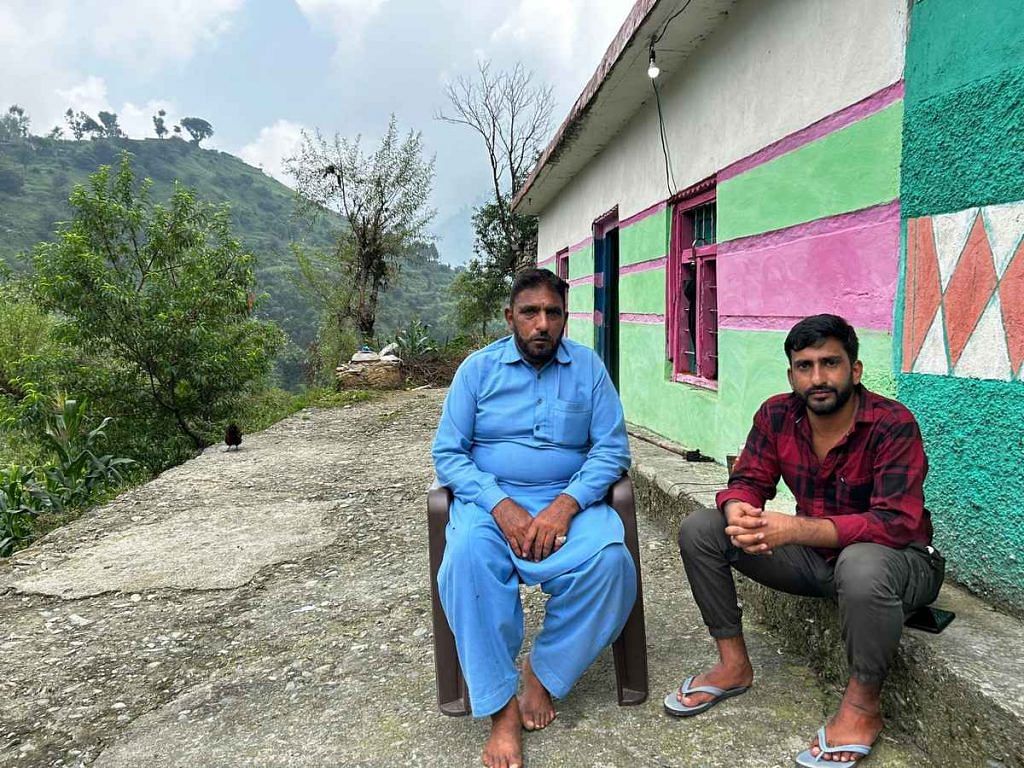
On 8 July 2016, Rafik’s trial kicked off in Goregaon’s sessions court. Over a span of seven-and-a-half years, a procession of 26 witnesses took the stand.
In the middle, about three years into the trial, a bombshell was dropped. The police claimed that Mumtaz was raped before she was murdered. To back this allegation, they submitted semen-stained pyjamas and a bolster as evidence. The court admitted the charge under IPC section 376 (punishment for sexual assault).
“Section 376 meant that Rafik would be denied bail in the sessions and high courts as he was branded a sexually perverted man,” advocate Khan said.
‘Insufficient evidence’ & acquittal
With all hope of bail evaporating, Rafik said he felt the crushing weight of each passing day, but he also saw the prosecution’s case falling apart, bit by bit.
The police maintained that Rafik killed Mumtaz to instil fear in residents to keep his job, but Rizwan Society members debunked this theory in court. Gulamrasul and two other members, Dr Naushin Imran Menon and Mohd Yusuf Abdul Karim Shaikh, deposed that Rafik was not facing dismissal from his job.
The police scored some self-goals too. They had asserted that Rafik had “absconded” to the hills immediately after the murder, but their own signed undertaking at Darhal police station exposed this theory as false. It stated that Rafik had willingly accompanied them.
Witnesses, including the victim’s husband, attested to seeing Rafik in the police station in the days following the murder.
The additional rape charge also crumbled in court. The evidence presented by the police—a couple of semen-stained objects—failed to substantiate sexual assault. The court noted that the medical officer had “not opined anything” about rape in the postmortem report.
“When I was in the lock-up, the police had taken my semen and planted the evidence,” Rafik told the court.
Then the police said that Rafik entered B wing and reached D wing through the terrace and committed the murder. However, the prosecution never placed CCTV footage to that effect on record. Further, the investigating officer acknowledged that the recording only showed Rafik entering the B wing.
Finally, on 31 July 2023, the court noted that the prosecution did not have “material sufficient enough to prove any of the charges”.
“In such serious offences, the investigation officer has not shown any intelligence while examining the scene of offences, which is normally expected from senior officers,” the court order, of which ThePrint has a copy, said.
“Having regards to the facts and circumstances of the case, the defence of the accused appears to be probable,” it added.
What wounded Rafik’s family most deeply was the sense that their identity as Gujjar Muslims had made it easier for the police to act with impunity.
The court then acquitted Rafik of all charges and ordered that his Aadhaar Card and the Rs 280 recovered from him be returned after the appeal period ended.
Mumbai police, however, are refusing to move on.
Speaking to ThePrint, Mohan Ganpat Patil, a senior inspector at Oshiwara Police Station said that the police are in the process of appealing the court order in the high court.
Former investigating officer Ganme, who retired two years ago, said that he too planned to approach the court.
“We worked 24×7 on this case and had nightmares. We wouldn’t have done it if we weren’t convinced about our evidence. I am retired now but I will go to the high court myself and challenge this order,” he said.
After 7 years, ‘acquittal considered sufficient relief’
Rafik’s lengthy trial isn’t uncommon, given the overloaded lower courts.
According to the National Judicial Data Grid, as of March 2022, more than 4 crore cases are pending in different courts in India. Of these, 87 per cent are pending in lower courts. Maharashtra comes third among the states, with 8.3 lakh cases pending, out of which 3.9 lakh are criminal cases.
In Rafik’s case, there were times when the prosecutor was busy with other matters, delaying hearings. Two years of Covid added to the long wait. At that time, like thousands of accused across the country, Rafik, too, was produced in court through video conferencing.
Getting bail in a murder case is difficult, but the additional rape charge three years later made it next to impossible.
“The case was being manipulated from the day of the FIR. A migrant labourer from Kashmir was made a scapegoat knowing that no one would come to his rescue,” advocate Wahab Khan added.
Khan said that, to him, Rafik’s case stands as a glaring example of how an investigation officer manipulated evidence to a degree that led to bail being denied during the trial.
“Unfortunately, we don’t have any remedy in cases where innocents are framed by police officials by manipulating the evidence. An acquittal even at a belated stage is considered to be sufficient relief,” advocate Khan said.
Rafik may be ‘free’ now but his lost years have weighed down his shoulders.
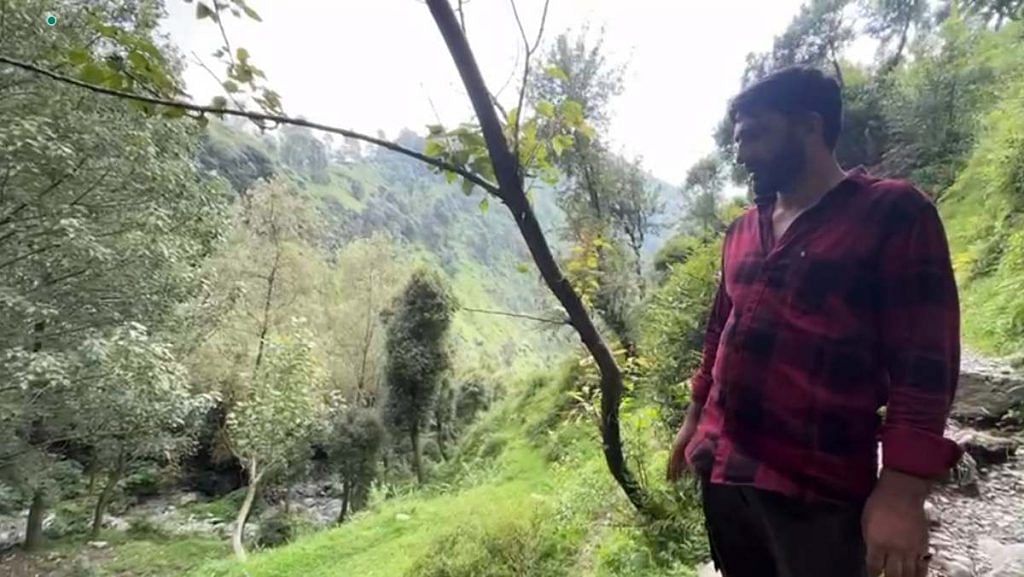
For now, he has resumed working at the Rizwan Society and says he is pleased with the warm welcome he got. He is taking it one day at a time for now.
He still struggles to describe his long-term plans. Instead, he launches into a detailed description of water supply issues at the society and how he’d always help resolve them.
“I will work here for now. After that, I don’t know. Inshallah, everything will fall in place,” he said, his voice trailing off.
An existential crisis
Many years ago, Wali Mohd brought a TV from Mumbai, and the family sat down to watch the 2003 film Tere Naam. But when a scene unfolded with the hero being brutally beaten and taken away to an asylum, it proved too much for Zubeida Begum. Overwhelmed, she fainted.
“She felt so much for a character on the screen, then what would have she gone through when her son was subjected to injustice?” Wali Mohd asked. He sold the TV after that episode.
But when Rafik was sent to jail. Zubeida found strength. For seven years, she held down the fort in Jammu with her daughter-in-law and grandchildren. “Every time I fed my grandchildren, I was reminded of Rafik,” she said.
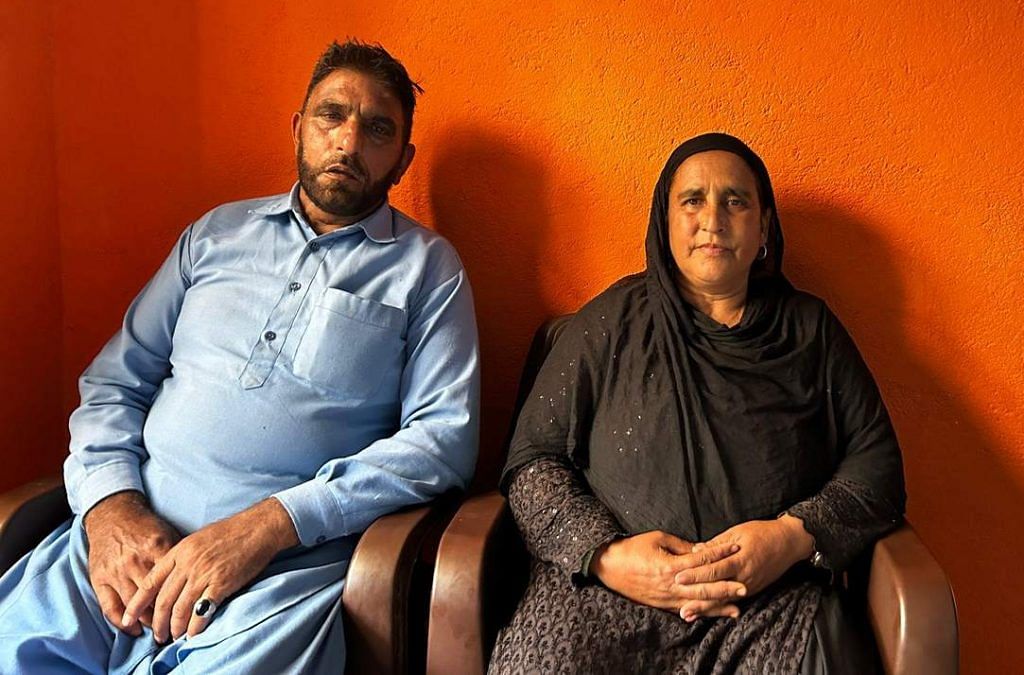
Despite the harsh winters, the decaying farmland, and mounting debt that shot up to Rs 8 lakh, Zubeida insisted that her husband remain in Mumbai to support Rafik.
But beyond these hardships, what wounded Rafik’s family most deeply was the sense that their identity as Gujjar Muslims had made it easier for the police to act with impunity.
“The whole case was made up by policeman Ganme. I am not saying that he framed me because I was a Gujjar Muslim from J&K but he definitely thought that no one would come looking for me in Mumbai,” Rafik said.
Also Read: ‘Murderer’s mom’—Not just the prisoner, their family also goes on death row in India
‘You Kashmiris are like this’
In prison, Rafik’s sense of isolation and estrangement deepened, not solely due to his incarceration but also due to a growing feeling that India had a shrinking space for someone like him.
Each day, every passing year, he read news that cast a shadow over him.
“First, I got to know about the abrogation of Article 370 in J&K. Then the news about CAA-NRC protests across India kept me in anxiety as the inmates would discuss these matters,” Rafik said.
Then Covid came and some inmates were released, but Rafik remained behind bars, denied bail. However, it also steeled his resolve.
“I wanted to clear my name once and for all. That is why when the High Court rejected my bail (in 2018), I was not that hurt,” he said.
Yet, as cases like the Hyderabad gang rape in 2019 and the Shraddha Walkar murder in 2022 gained national momentum and took on a communal tone, he feared the worst.
“Such cases impact other trials too. I thought I would never be able to see my home and mother again,” he said.
One chilling memory etched into his mind was the terrorist attack on the Pargal Army camp, near his home, in August 2022. He feared his mother might have been hurt.
“I read Darhal in the news and my heart sank,” he said.
All he could do was cling to moments of solace. He dragged back his thoughts to learning Marathi or when his mother got an outfit stitched for him and sent it through his father.
Yet, there were times when he felt utterly alone. One night, the 2022 film The Kashmir Files was screened for the inmates in Arthur Road Jail.
He was riveted by the film.
“This was for the first time I learnt about what happened in Kashmir. In our Jammu hills, we live in harmony. My school principal was a Hindu,” Rafik said.
But to the other inmates, there was no difference between Jammu and Kashmir. Even though Rafik had never set foot in Kashmir, a fellow inmate suddenly turned on him.
“You Kashmiris are like this,” he shouted.
After this moment, Rafik said, he was an outsider even among the other inmates.
(Edited by Asavari Singh)


